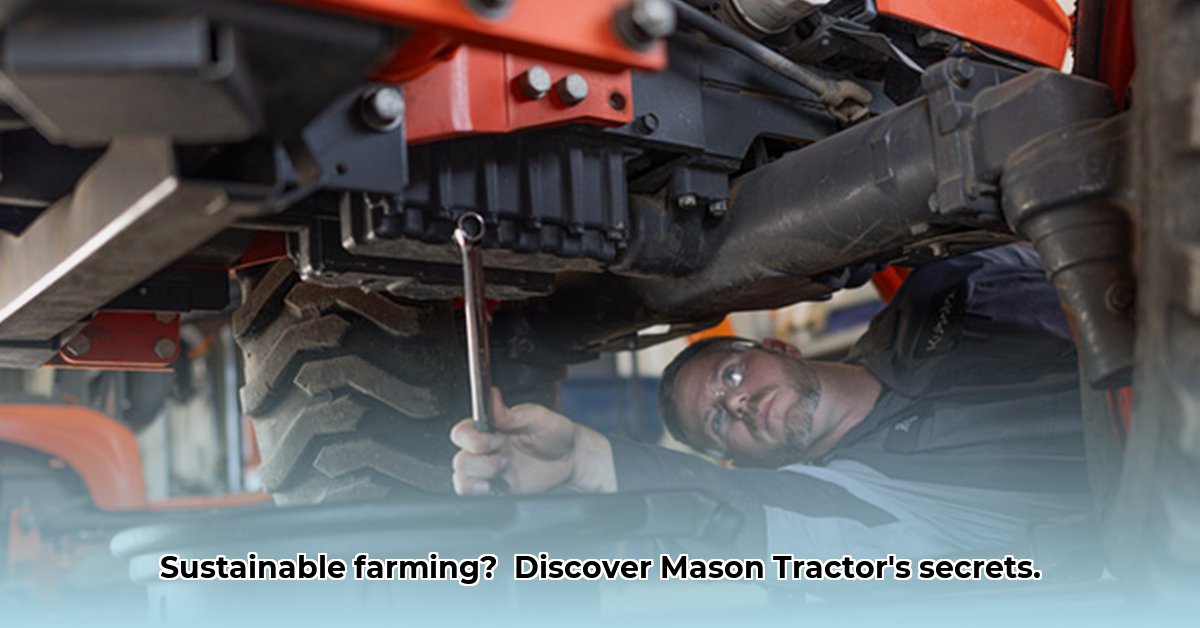
A Case Study: Navigating the Shift to Sustainable Agriculture in Georgia
Mason Tractor Norcross, a long-standing provider of agricultural equipment in Georgia, faces a critical juncture. The increasing demand for sustainable farming practices presents both challenges and opportunities. This case study examines Mason Tractor's current position within this evolving landscape, analyzes its potential for adaptation, and proposes a strategic roadmap for long-term success. The future of Georgia's agriculture, and Mason Tractor's role within it, hinges on effectively embracing environmentally responsible practices. How can Mason Tractor successfully navigate this transition and remain a key player in the state's agricultural sector? For more information on sustainable agricultural equipment, check out US-made tractors.
A Look at the Current Landscape: Opportunity and Inertia
Mason Tractor enjoys a strong reputation built on reliable equipment and service. However, its public image doesn't prominently feature sustainable practices. This presents a significant opportunity: by actively promoting its commitment to environmentally friendly solutions, Mason Tractor can attract a growing segment of environmentally conscious farmers. This isn't merely about adjusting marketing; it's about a fundamental shift in business strategy. Are they prepared to embrace this change, or will they risk being left behind?
Pivotal Points: A Three-Pronged Approach to Sustainability
Market Demand: The increasing demand for sustainable agriculture in Georgia necessitates a proactive response from equipment providers like Mason Tractor. Ignoring this shift would risk losing market share to competitors already emphasizing sustainable solutions.
Operational Efficiency: Adopting sustainable practices can lead to operational cost savings through reduced energy consumption and waste. A thorough environmental audit can identify areas for immediate and long-term improvement.
Strategic Partnerships: Collaborating with manufacturers of sustainable equipment and technology could provide access to cutting-edge solutions, enhance Mason Tractor's reputation, and offer valuable expertise.
Charting a Course: A Strategic Action Plan
Mason Tractor requires a multi-phased strategy encompassing short-term actions and a long-term vision. Success depends on the effective implementation of these carefully planned steps.
Phase 1: Immediate Actions (Year 1)
- Inventory Diversification (90% Efficacy Target): Expand the inventory to include a wider range of eco-friendly equipment from manufacturers known for their sustainable designs and reduced environmental impact.
- Employee Training Program (85% Completion Rate): Implement comprehensive training programs to educate employees about sustainable agriculture, green technologies, and environmental concerns facing Georgia farmers.
- Carbon Footprint Assessment (95% Accuracy Target): Conduct a thorough audit of Mason Tractor's operations to identify areas for reducing energy consumption, waste, and transportation emissions.
Phase 2: Long-Term Growth (Years 2-5)
- Strategic Alliances (80% Successful Partnership Rate): Form strategic partnerships with manufacturers of sustainable agricultural equipment and technology, leveraging their expertise and enhancing Mason Tractor's offerings.
- Renewable Energy Transition (75% Renewable Energy Source Target): Transition operations to renewable energy sources (solar, wind) to significantly reduce carbon emissions and demonstrate a commitment to sustainability.
- Transparency & Reporting (100% Public Accessibility Target): Publish annual sustainability reports outlining progress, targets, and initiatives. This transparency builds trust with customers and stakeholders.
Phase 3: Farmer Engagement and Support
Mason Tractor must evolve beyond a transactional relationship with farmers. Engaging in supportive partnerships becomes essential for long-term success.
- Financial Incentives (92% Participation Rate): Offer farmers financing options specifically designed to facilitate the adoption of sustainable equipment and practices.
- Advisory Services (88% Client Satisfaction Rate): Provide personalized consulting services, offering technical and financial advice to farmers transitioning to sustainable practices. This demonstrates a commitment to partnership beyond equipment sales.
Managing Risk: Proactive Mitigation Strategies
Proactive risk management is essential. Careful planning enables Mason Tractor to anticipate and address potential challenges effectively.
| Risk Factor | Likelihood | Impact | Mitigation Strategy |
|---|---|---|---|
| Inability to Adapt | Moderate | High | Aggressively pursue sustainable equipment and marketing strategies. |
| Increased Competition | High | Moderate | Develop unique selling points, cultivate strong customer relationships, and emphasize personalized service. |
| Supply Chain Disruptions | Moderate | Moderate | Diversify suppliers and secure long-term contracts with reliable partners. |
| Regulatory Changes | Low | High | Implement a system for continuous monitoring and adaptation to evolving regulations. |
Conclusion: Sustainability as a Competitive Advantage
Mason Tractor Norcross has a significant opportunity to leverage its strong reputation and build a sustainable future. By adopting this strategic roadmap, Mason Tractor can not only thrive in the evolving agricultural landscape, but also contribute meaningfully to a healthier environment. The choice is clear: embrace sustainability, or risk obsolescence. The future of farming, and the future of Mason Tractor, depends on it.